Since its handover to China in 1999, Macao has experienced rapid economic growth, which in turn has led to an increased demand for professionals in various fields. To keep pace with the rapid change, higher education institutions in Macao have been trying to recruit more students and enhance their quality of education. The University of Macau (UM) is no exception. As the only public comprehensive university in Macao, UM is committed to contributing to the local and international communities through high-quality education and cutting-edge research. Both Macao and UM have experienced a sea change over the past 20 years. Looking ahead, how can UM build on this foundation to scale new heights and fulfil its new mission?
Fast Development Since Macao’s Handover to China
Macao’s handover to China ushered in a new era for UM, where the university experienced rapid development. At the time, Macao needed a modern and internationalised university, not only to meet the needs of a rapidly developing economy, but also to bring Macao in line with the global trends of higher education. In view of this, UM revised its Charter. In 2006, the Legislative Assembly of Macao passed the new Judicial Regime of the University of Macau and the new Charter of the University of Macau. The revised versions of these two documents enabled UM to implement a modern governance model in line with international practices.
The year 2009 marked the tenth anniversary of Macao’s return to China. It also represented an important milestone in UM’s history, because it was in this year that the central government approved the construction of a new UM campus on Hengqin Island, Guangdong province, and authorised Macao to exercise jurisdiction over the new campus. This unprecedented bill turned UM’s ‘new campus dream’ into a reality and allowed the university to pursue its educational ideals on a much larger campus. In the same year, the University of Macau Development Foundation (UMDF) was established, with the aim of enhancing UM’s global competitiveness. The UMDF represented a new endeavour on the part of the local government to support higher education development, and demonstrates the unreserved support of UM felt by people from all walks of society.
It took a little over three years for the new campus design, construction, and relocation to be completed. The new campus was inaugurated on 5 November 2013. An unprecedented project in Macao’s higher education history, the new campus provides an excellent environment for learning and teaching. Upon relocation to the new campus, the university built Asia’s largest residential college system to facilitate the implementation of whole-person education.
20 years ago, UM only had 2,865 students. Now, the number exceeds 10,000. UM alumni have become valuable members of society in different parts of the world. Most judicial officers, judges, prosecutors, attorneys, secondary school principals and teachers in Macao, as well as over one third of the members of the Legislative Assembly, are UM alumni.
On the front of scientific research, UM has also made significant progress in the fields of science and technology, humanities, and social sciences. According to statistics from the Web of Science, the number of papers published by UM scholars in renowned academic journals increased from around 140 in 2009 to over 1,500 in 2018, which is more than a ten-fold increase. The citation frequency of UM scholars’ published papers increased from 30 in 2000 to around 24,400 in 2018, an increase of 800 times. The university is now among the top 1 per cent in Essential Sciences Indicators (ESI) rankings in six subjects, namely Engineering, Chemistry, Pharmacology & Toxicology, Computer Science, Clinical Medicine, and Social Sciences, General.
According to Rector Yonghua Song, UM has become quite influential in China, Asia, and the world, for the quality of its graduates and its research output. He says, ‘Overall, both UM and Macao have experienced a sea change over the past 20 years, during which we have developed our distinctive characteristics and unique advantages. It would have been difficult to imagine back then what the university would accomplish in 20 years.’
Supporting the SAR Government’s Effort to Promote Technological Innovation
In 2018, UM and several other higher education institutions in Macao submitted a joint letter to President Xi Jinping. President Xi soon sent a reply letter, in which he gave important instructions and expressed his hope for higher education institutions in Macao to produce graduates with a love for China and Macao, and to create more results in science and technology, to support the diversification of Macao’s economy and the development of the Guangdong-Hong Kong-Macao Greater Bay Area.
UM has always attached great importance to academic research and innovation in science and technology. With the support of the Ministry of Science and Technology and the Macao government, the university has established three state key laboratories, focused on microelectronics, Chinese medicine, and Internet of Things applications for smart cities, respectively. The cutting-edge research conducted by the three labs has reached world-class standards. In addition, UM has established some new faculties and institutes to expand the frontiers of science and technology and to enhance the research capacity of Macao and China. These new institutes include the Faculty of Health Sciences, Institute of Applied Physics and Materials Engineering, Institute of Microelectronics, Centre for Cognitive and Brain Sciences, Centre for Artificial Intelligence, and Zhuhai UM Science & Technology Research Institute.
According to Rector Song, in addition to continuously enhancing the quality of research, UM also spares no effort to promote knowledge transfer and commercialisation of research results. For instance, it actively supports its researchers to carry out innovative research projects, to participate in the establishment of national scientific research platforms, and to apply for cross-border research grants and research projects in the Greater Bay Area.
Promoting the Internationalisation of Higher Education in Macao
To promote the internationalisation of higher education in Macao, UM is actively expanding its overseas network and building new platforms for international collaborative research. In recent years, the university has worked hard to enhance the quality of its Portuguese language education to produce high-calibre Chinese-Portuguese bilingual professionals. To achieve this end, it maintains close contact with universities in Portuguese-speaking countries. Moreover, it attracts outstanding students from Portuguese-speaking countries and countries covered in the Belt and Road Initiative with scholarships and other forms of sponsorship. Through these strategies, the university hopes to contribute to the Belt and Road Initiative and the Macao government’s plan to develop the city into a world centre for tourism and leisure and a service platform for trade between China and Portuguese-speaking countries and a base for cultural exchange and cooperation.
In addition to creating an international environment for teaching and learning and enhancing its international reputation, UM actively seeks to enhance the global competitiveness of its academic programmes. For instance, four programmes offered by the university’s Faculty of Science and Technology have received full accreditation from the Hong Kong Institution of Engineers (HKIE).
They are the Bachelor of Science in Civil Engineering, the Bachelor of Science in Computer Science, the Bachelor of Science in Electrical and Computer Engineering, and the Bachelor of Science in Electro- mechanical Engineering. Three of these programmes have also been recognised by members of the Washington Accord. The Faculty of Business Administration has earned accreditation from the prestigious Association to Advance Collegiate Schools of Business, becoming the first business school in Macao to be accredited by the association. The Bachelor of Science in Accounting programme offered by FBA has been accredited by CPA Australia, the Association of International Accountants in the United Kingdom, and the Hong Kong Institute of Certified Public Accountants. Graduates of these programmes are exempt from most professional level examinations administered by these associations.
Through years of effort, UM’s research capacity is steadily increasing. In recent years, it is ranked among the top 400 universities in both the Times Higher Education (THE) World University Rankings and the Quacquarelli Symonds (QS) World University Rankings. In Asia, it is ranked No 42. In terms of international outlook, it is ranked No 9 in the THE World University Rankings.Source: UMagazine Issue 21
Related articles:Internationalisation through New PositioningNew Research Blueprint to Meet Global TrendsEnhancing UM’s International Reputation with a New Global StrategySupporting Macao’s Development with Whole-person EducationCreating an Environment to Support the University’s Development
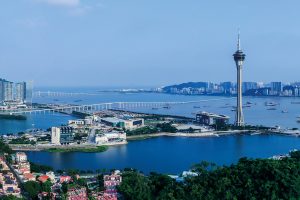
Since its handover to China in 1999, Macao has experienced rapid economic growth
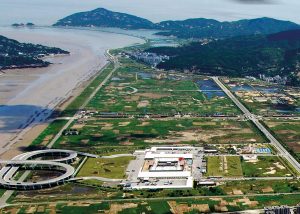
UM’s new campus in 2009
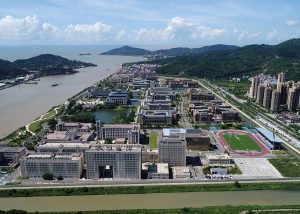
UM’s new campus in 2019
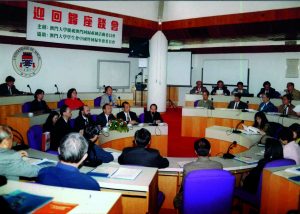
UM holds a seminar on Macao’s handover to China in 1999
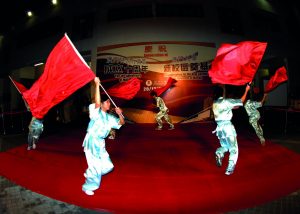
UM members celebrate the tenth anniversary of the Macao SAR and the groundbreaking ceremony for the new campus in 2009
